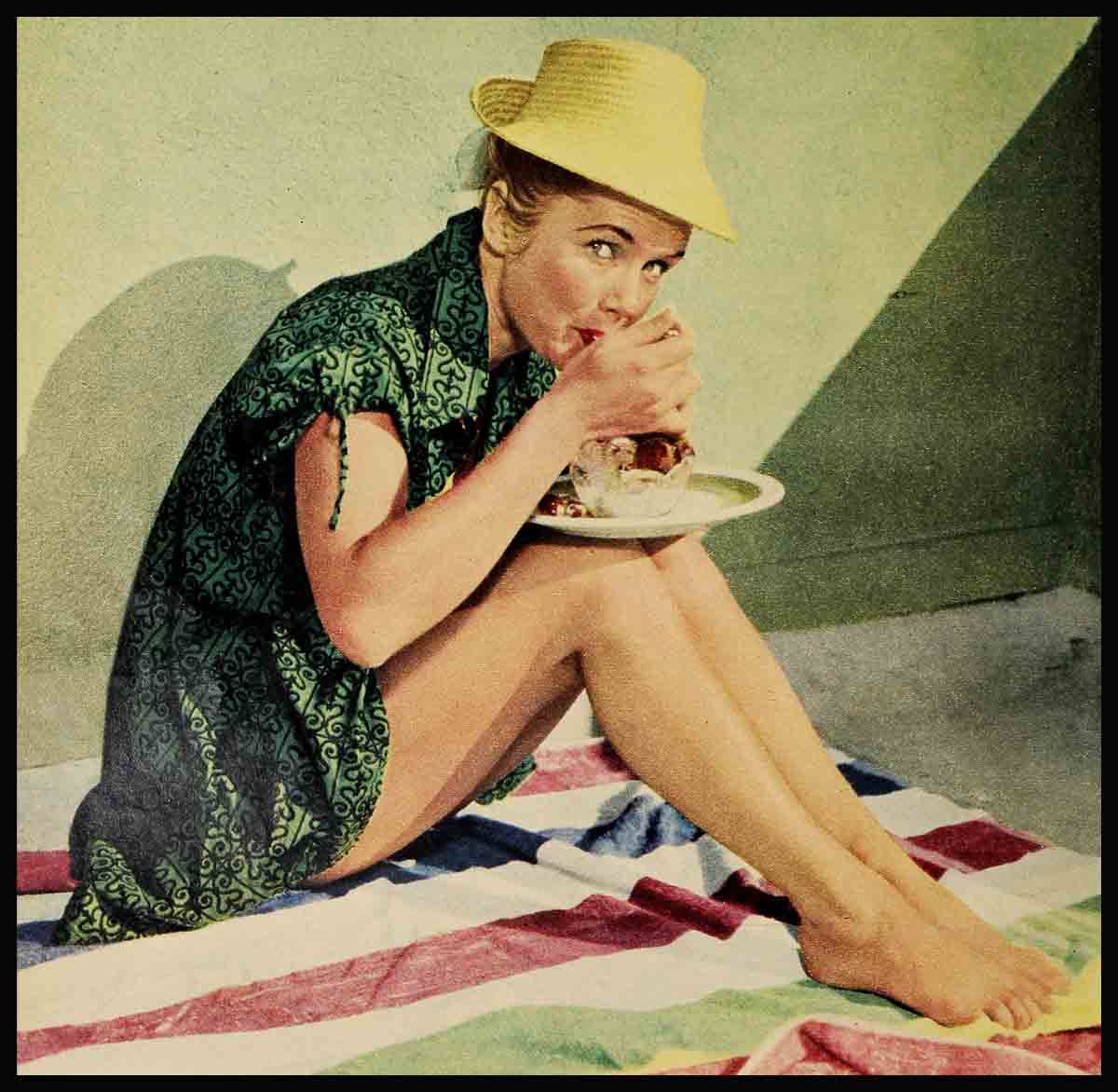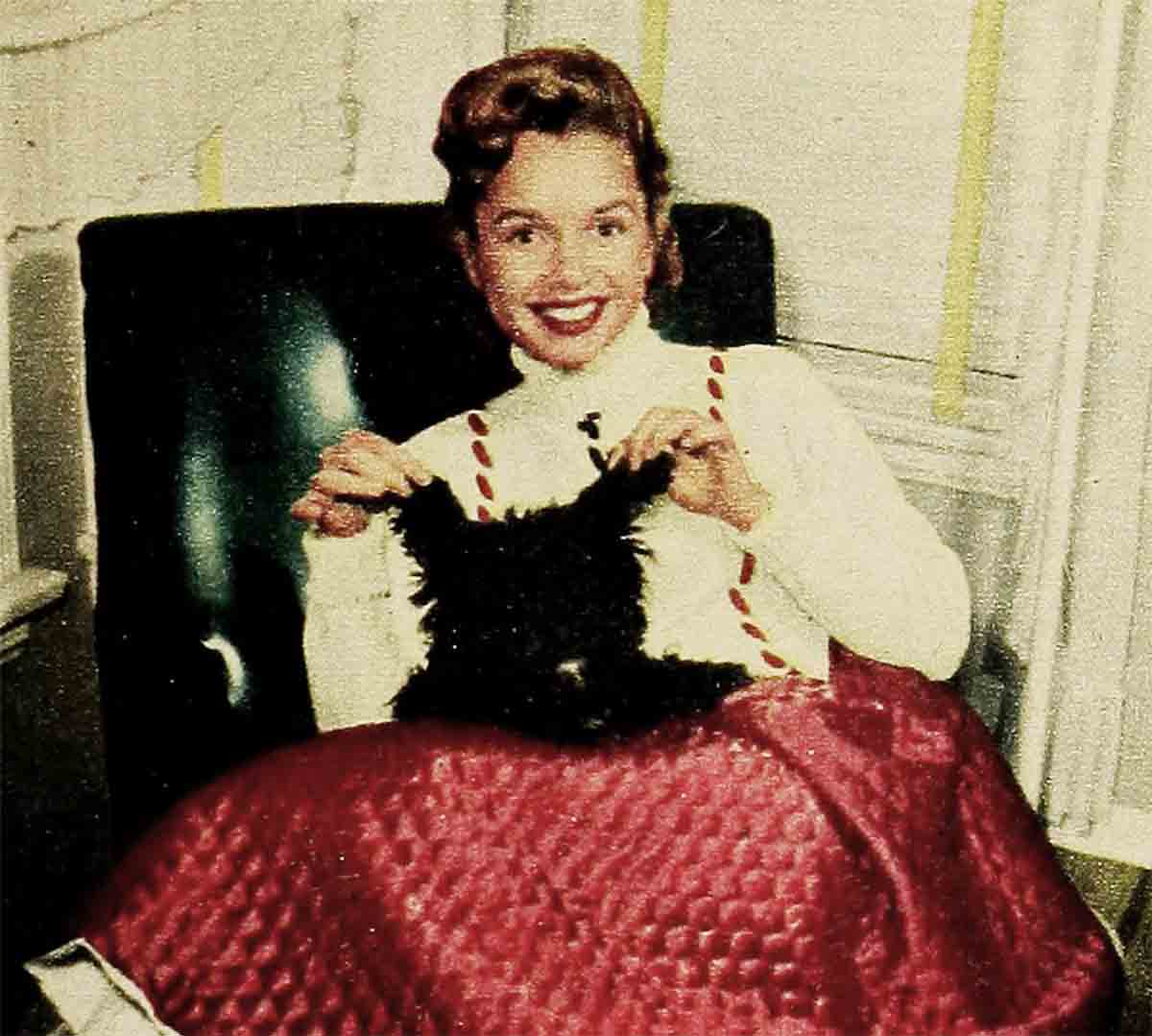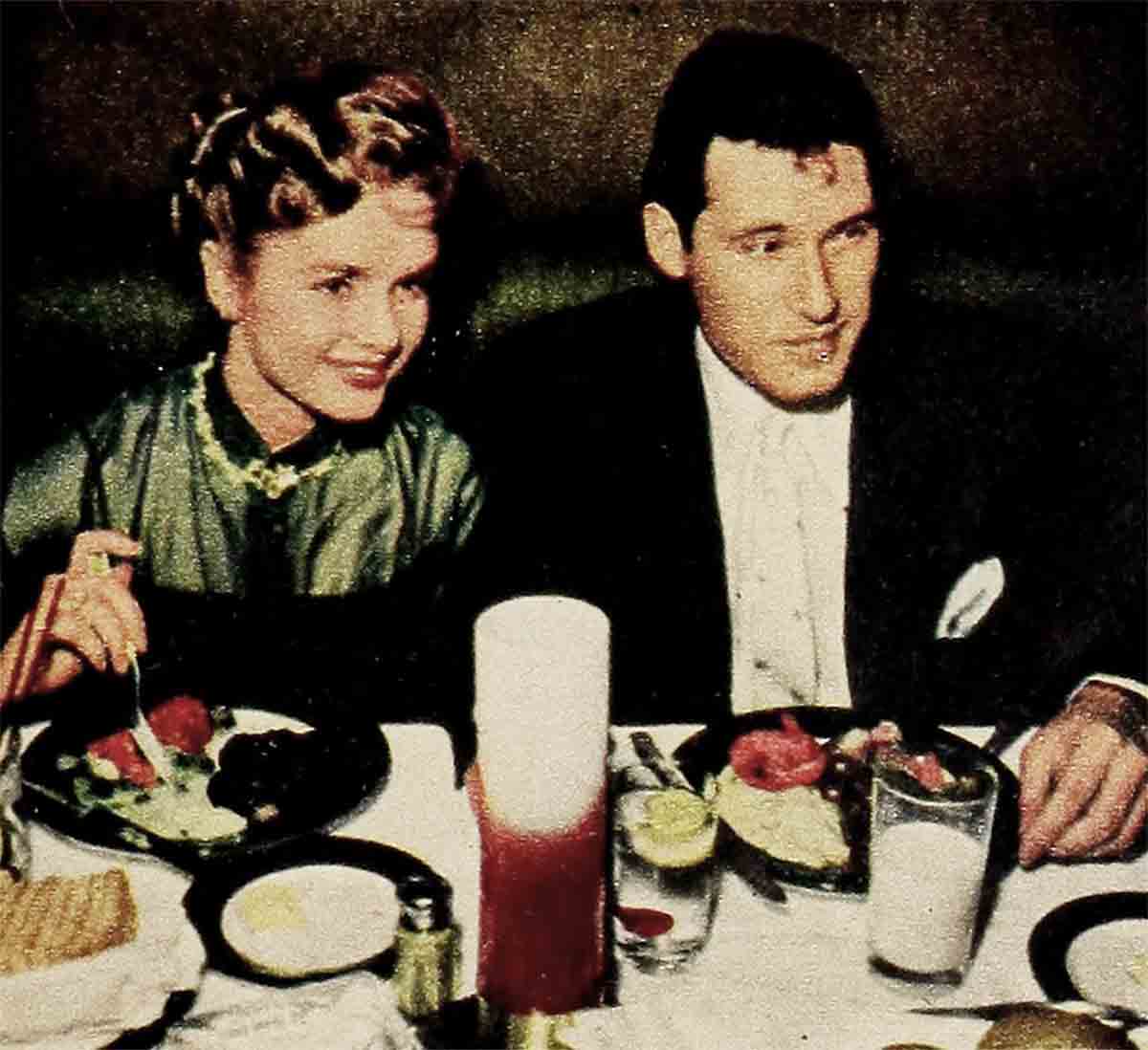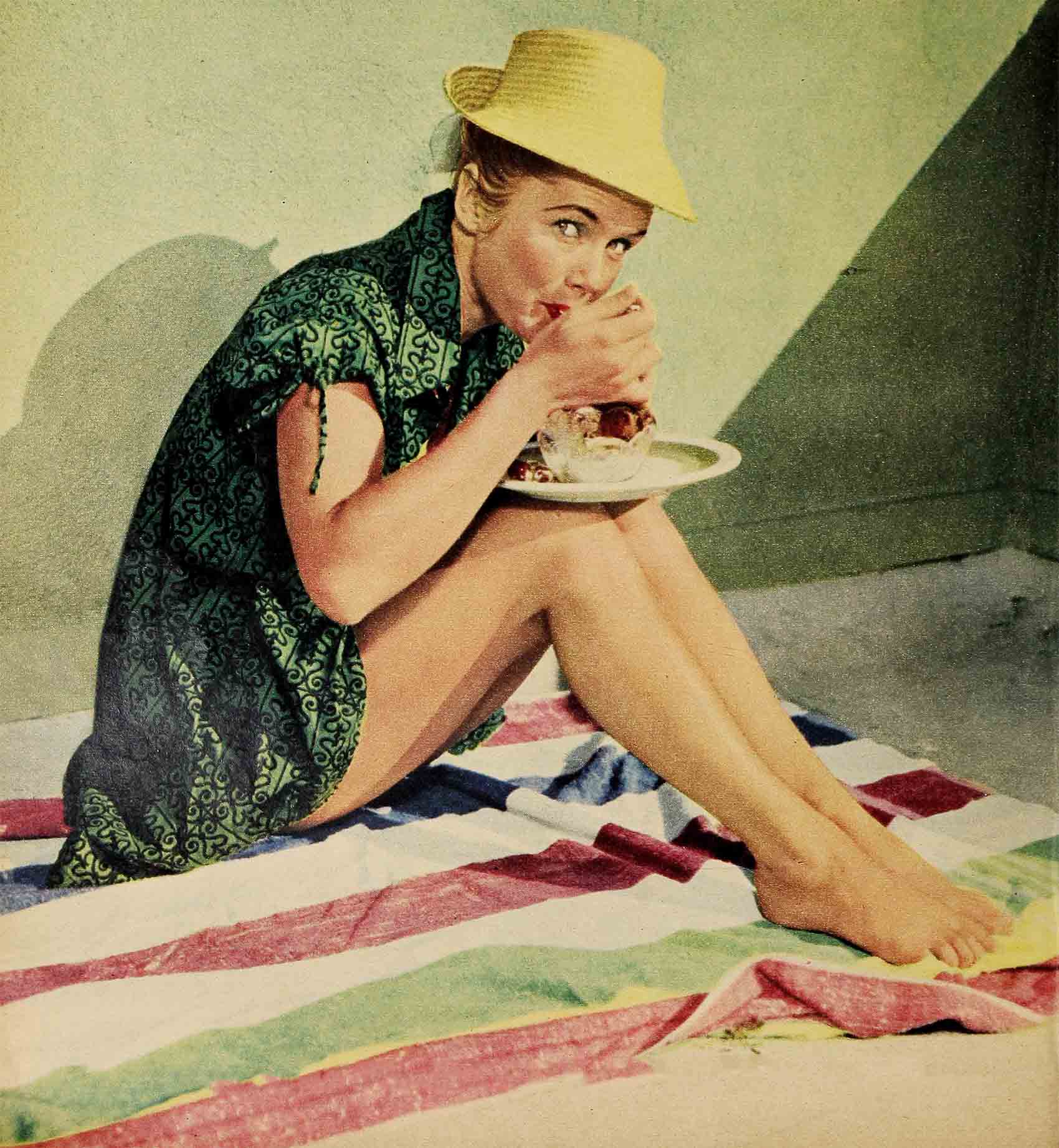
Her Heart Won’t Be Broken!—Debbie Reynolds
“If you see my darling with somebody new, Keep it a secret whatever you do,”
The misty, California spring night had given way to grey, early morning fog when a young girl, a small and pert young beauty, stepped out from the Los Angeles Airport waiting room onto the passenger loading apron. She wore a light, tailored suit, a gay, knitted cloche on her head and fingered an icebox-fresh corsage pinned at her throat.
With her came a middle-aged couple. The three stood for a few minutes in a fond, close grouping and then with a last, quick embrace for each of them the girl turned and ran for her plane. Motors roared. The DC-4 taxied slowly away. Debbie Reynolds was leaving Hollywood for an extended tour . . . leaving with a saddened heart.
There should have been another there, a tall, darkly handsome boy, but he wasn’t . . . unless you count the memory of him which filled her mind. Once they had been close, once she would have had a right to expect him there, once his hand would have been the last to touch hers before she left. But that had been once. Now it was not like that. Now you hear of him being with others . . .
“Why should you tell me and break my poor heart?
Then foolish pride would just drive us apart.”
Debbie Reynolds and Bob Wagner were never engaged. He never gave her.a ring. They never announced that they were going steady. They were young and like the young made a lot of their independence. It’s just that for almost three years they were a pair; they liked each other better than anyone else, they had regular Saturday night dates and many spur-of-the-moment weekday dates, they met each other’s folks and approved of each other’s folks and were in turn approved by them. All of this, you might say, building in their lives . . . and then, nothing.
Maybe it hurts more than it should because Debbie, before she met Bob, was a laughing bubble of a girl; too happy about being just young to be bothered about being young and wanted. Debbie was the kind of miss who wouldn’t give you a plastic penny for all the lovey-dovey in the world.. She preferred to talk bop through her gum and park herself in any position she liked and the heck with ladylike decorum or much-minded escorts. She used to insist that as far as boys were concerned, “I can go along with a goodnight kiss but, frankly, it doesn’t do a thing for me.”

She used to have a way of saying she wouldn’t think of marrying, then, after a pause, adding, “Not until I’m at least 24, at least.” Life was too full of movement to hold still for mooning. There was dancing—that really “stoned” her. There was swimming—she “flipped her lid” about swimming. There was volley ball and playing her French horn and leading her girl scouts and camping and making pictures and, for that matter, just the big kick she got out of talking and eating and sleeping. “Anything’s fun if you give it a chance,” she would say, meaning it didn’t have to be boys.
The Debbie of those days? Well, there was the time her brother, Bill, prevailed on her to go out with a buddy of his. Bill had been after her to do this for a year because this friend was “real gone” on her.
“Well . . .” said Debbie, skeptically, and finally went. That night she didn’t come home until near midnight. She stamped into the house angrily, walked over to Bill’s room and banged the door open.
“Ah-h-h! What a shmo!” she cried. “What a shmo your pal is! So I’ve been sitting in his car for an hour. So he’s been breathing in my ear and kissing the back of my neck. I hope you’re satisfied!”

But then she met and began dating Bob. They mostly did the things Debbie liked to do. They went bowling on those Saturday night dates. They went dancing . . . but rarely to those intimate, night spots; Debbie liked well lit halls. Generally they had a ball and Debbie began to change her tune—as if her old ideas were beginning to clash with new dreams. She let it be known that she might marry at 23; and only last year, while she and Bob were still dating, she announced that maybe 22 would be a nice age for wifehood. But that was the last remark on the subject. Quietly, very quietly, it began to be evident, not too long ago, that ‘she and Bob weren’t seeing each other any more. Almost everyone who knew them felt badly and hoped otherwise. But it was true.
The ending, it is pretty well established, was Bob’s idea. Debbie, it is quite clear, didn’t make a fuss about it. And it is Bob who has seemed able, more easily, to pick up with a new life . . . and with new girls. (For the full story of Bob Wagner’s “new life” read Too Far, Too Fast?) And wherever he goes with them, dancing at the Mocambo with this one, cutting up at a Beverly Hills party with that one—so often on the Saturday nights that used to be Debbie’s Saturday nights—there is always someone who has to make sure it reaches Debbie’s ears. As if she wants to know. As if she doesn’t repeatedly plead that she would much rather not know.

“ . . . If you see my darling in some rendezvous,
Painting the town with a girl he once knew . . .”
Those who know Bob refuse to believe that he isn’t still crazy about Debbie. They say that when Rory Calhoun and his Lita Baron gave a birthday party for him last February and he learned, on arrival, that Debbie had volunteered to be a co-hostess, he was deeply touched. It was a surprise party. Bob came alone: When he entered Debbie was there with a trumpet and blowing him a fanfare salute. Lita was unrolling the red carpet. Bob and Debbie quickly paired off and talked for a long time. But after the party was over . . . nothing had changed. Bob went back to his new ways. They spoke again only a few times, and these times over the telephone. When Bob went out it was again with someone else.
Hollywood always has to explain things to itself in down to earth terms, and in Bob’s case there are any number of stories to account for his defection, some of them perhaps more vivid than accurate. More simply it could be said that at 23 Bob is beginning to find the social level of his dates with Debbie (a level which she set), too immature for him . . . or thus it seems to him. He feels he is growing up past the dancing at the Palladium, the jitterbugging (which she taught him), the weenie roasts at the beach, the picnic jaunts to the mountains, and the whole round of bobbysox cavorting. Spending more and more time with such comparatively blasé companions as Dan Dailey Jr., and Dale Robertson, even to the point of getting a new apartment near them, his tastes are said to be changing.
Dan and Dale, and others of his older friends, are supposed to have kidded him for “playing with little girls,” and Bob is reported to have suffered the mortification of the young male whose maturity is questioned by his seniors. He was caught between two outlooks on life; with Debbie he could not be a man of the world, with his more sophisticated pals it was uncomfortable, let alone unsuitable, to be anything else.
That Bob felt such a thing may be inferred from some of his more recent activities. How else could you explain such an extreme departure from normal routine for a 23-year-old boy as to go night clubbing with a 45-year-old woman . . . grey-haired Barbara Stanwyck? If this illustrates his inner compulsion to escape the brand of juvenility, breaking with Debbie seemed necessary for Bob.

In justice to Bob it should be admitted that this is a challenge that all youths face sooner or later. In Bob’s case it has been intensified, not only by his position as a star, and a darn good looking one, but by another personal involvement. He may be called any time now to go soldiering for Uncle Sam. The prospect of having to go to war has sharpened the appetite for life of many a boy before him. Manhood is like that.
Even more than a year ago Bob was giving evidence of wanting to spread himself as an eligible bachelor around Hollywood. Debra Paget began to be conscious of his attention during the shooting of Stars And Stripes Forever. Bob sought for her favor with a line that was half kidding and half serious. She resented it on two counts: he knew she never dated, and also, as far as Debra was concerned, Bob was Debbie’s boy friend and she valued Debbie’s regard. Eventually Debra got so angry at Bob’s persistence, particularly at columnist’s reports about them that she attributed to Bob, that she wouldn’t talk to him for a week.
Debbie is 21 now. She was 21 last April Fool’s Day she will tell you with a smile that, maybe has a little bitterness to it. She never talks about Bob as a rule unless someone else brings up his name.
“ . . . Pay no attention and just let it be, But keep it a secret from me.”
Once, when someone asked why they aren’t seeing each other any more, tears were reported to have come into her eyes and she replied, “Well, I guess he doesn’t like me any more.”

What worries her friends more than this is the kind of talk that makes them think Debbie might fall for someone on the rebound, words like this which she spoke not long ago: “I know my family and my friends would be happy if I fell in love—and they would trust my judgment. But until I can announce my engagement and get married within a few months I’m not even going to go steady.” Debbie is not unaware of Bob’s thinking, his motivations. She understands him because she has an older brother, after all, and is not unacquainted with the thinking of the young male when he becomes of age. And as her mother has told her, she is still young: “There is always time for love when you are 21.” Bob may want a change now but her best bet is to stay herself—by no means the old thoughtless and frivolous Debbie, but the kind of girl she is intrinsically, in contrast to the kind of girls he may be discovering in his new quests. For one thing she can’t help being herself, for another thing her instinct tells her this is the right thing to do.
But in the meantime Debbie is out to forget Bob. There may come another day but it is silly to count the minutes, the hours.
That was why she thought it wise to leave Hollywood for a series of radio and personal appearances. As. a matter of fact, she planned two jaunts. After a three week trip through the east she was to be back in Hollywood—but only for two days. A South American tour with Pier Angeli and Carleton Carpenter was to follow. And after that, Debbie might not be adverse to more travel—if needed. But in the back of her mind as she took off from Los Angeles was perhaps a strong hope; deeply hidden, but nevertheless there.
By the time she returns to Hollywood (and she will have been back some time when this is being read) Bob may have done with his “traveling” too. And maybe he’ll be “back” . . . back where he belongs.
THE END
—BY CONSUELO ANDERSON
(Debbie can be seen in MGM’s I Love Melvin and The Affairs of Dobie Gillis.)
It is a quote. MODERN SCREEN MAGAZINE JUNE 1953





No Comments